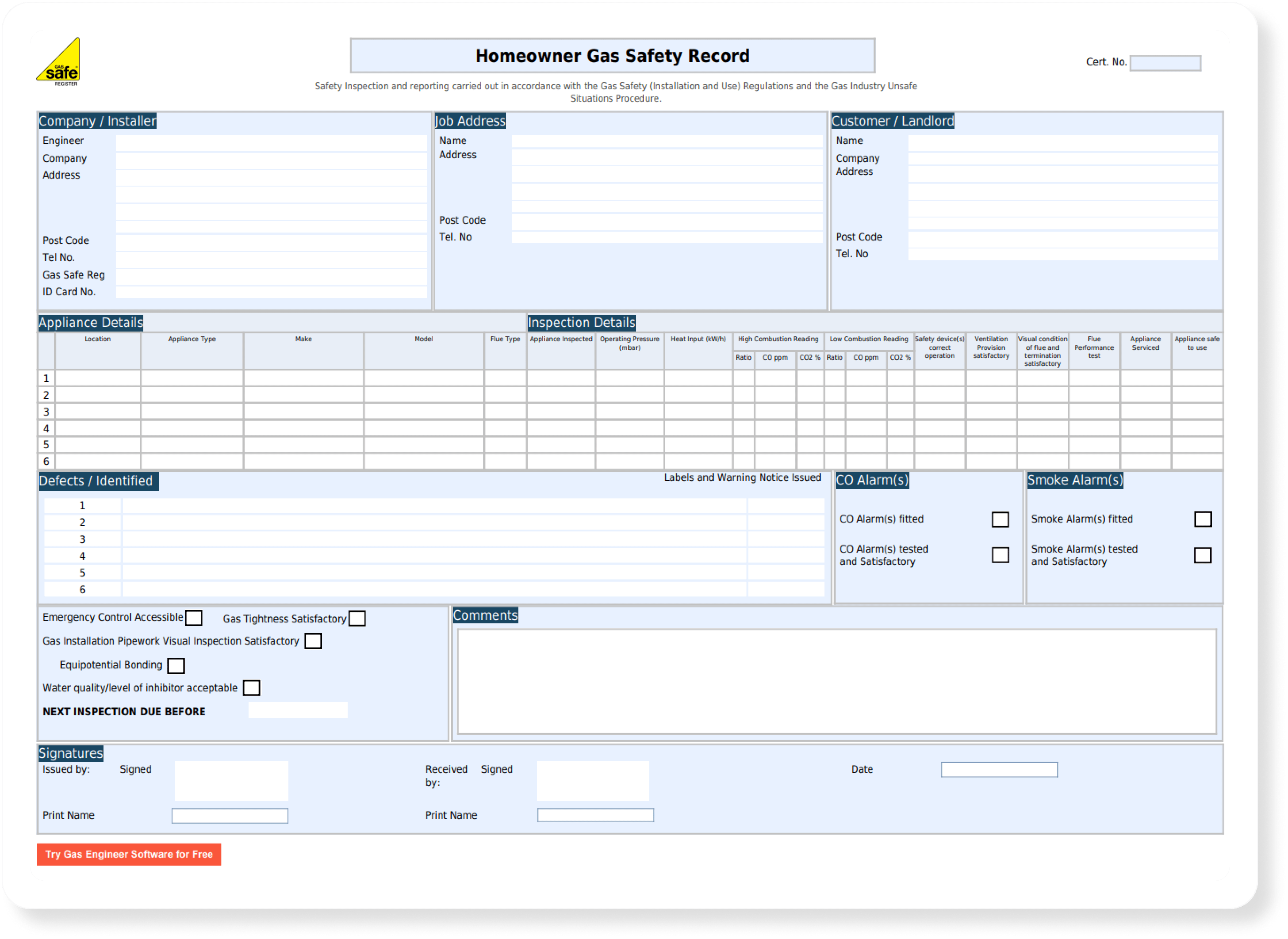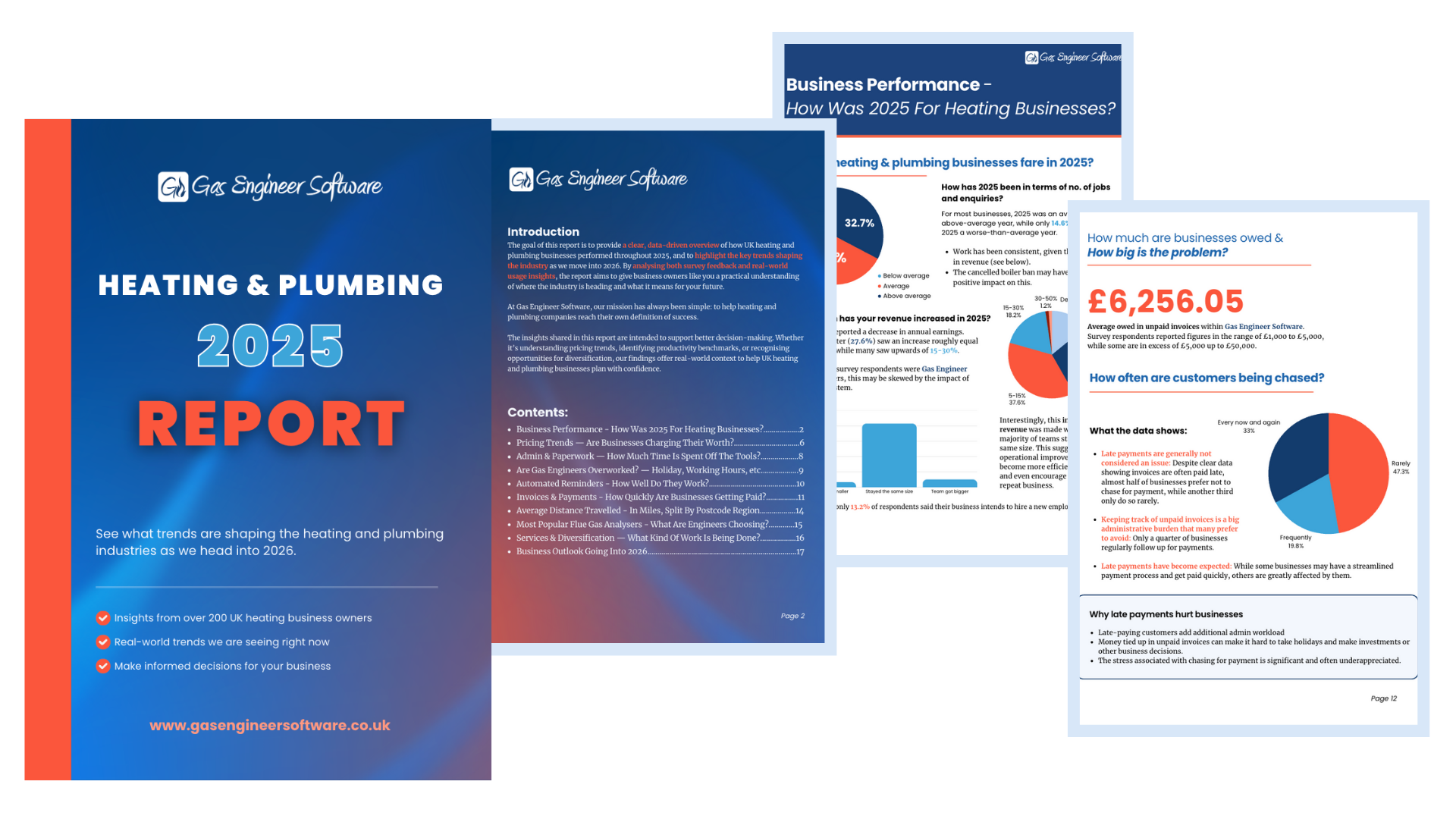Sole Trader vs. Limited Company: A Guide for UK Heating & Plumbing Engineers

Nearly every heating and plumbing business starts as a sole tradership: a one-man band doing everything from fixing boilers to picking up the phone and issuing invoices.
But businesses change massively as they grow and, sooner or later, the question of whether—and when—to incorporate crops up.
There are a variety of pros and cons to both structures, leading to some confusion about when exactly the switch becomes ‘worthwhile’ and what changes there are.
In this guide, we’ll cover everything you need to know about making the switch from a sole tradership to a limited company.
KEY TAKEAWAYS
You should consider incorporating your company if:
- Your profits are exceeding £40,000-£50,000
- You are hiring additional engineers/admin staff
- You intend to grow the business
Once you incorporate your business, you will need to:
- Update the Gas Safe Register
- Update your insurance
- Register as an employer for PAYE
The Basics: What’s the Difference Between a Sole Trader and a Limited Company?
Let’s keep it simple. The fundamental difference between a sole trader and a limited company comes down to one thing: you.
- As a Sole Trader, you are the business. There’s no legal distinction. The business’s profits are your personal income, and its debts are your personal debts. It’s simple and straightforward.
- As a Limited Company, the business is a separate legal entity. Think of it as a person in its own right. Once incorporated, your business can own assets, make profits, and incur debts. You are an employee and a director of that company. This separation is the key to everything that follows.
A company with ‘Ltd’ at the end of its name can look more established and credible. This can be a real advantage when quoting for large domestic jobs or trying to win commercial contracts.
The Pros and Cons of a Limited Company
Having a limited company is not outright “better” than being a sole trader. The right choice depends on the current state of your business, how you want to run it, and what your ambitions are. Here’s a balanced look at what you gain and what you give up.

The Benefits
- Limited Liability: This is the biggest advantage. Because the company is a separate entity, if the business runs into financial trouble or gets sued, your personal assets (like your house, car, and savings) are protected. As a sole trader, they can be put up as collateral. This is also relevant for any supplier/merchant credit accounts that are often risked against a sole trader’s personal assets.
- Tax Efficiency: This is the one everyone talks about. While it’s not always a simple “yes, you pay less tax,” it can be significantly more efficient, especially as your profits grow. Limited companies pay Corporation Tax on their profits. You can then pay yourself a small, tax-efficient salary and take the rest of the profits as dividends, which have lower tax rates than income tax. (Real-world example in the next section). Access our tax guide here!
- Professionalism: A company with ‘Ltd’ at the end of its name can look more established and credible. This can be a real advantage when quoting for large domestic jobs or trying to win commercial contracts.
- Succession and Sale: It’s generally much easier to sell a limited company or transfer ownership than it is to sell a sole trader business.
The Downsides
- Increased Administration: This is the main drawback. You have more legal responsibilities, including filing annual accounts and a confirmation statement with Companies House.
- Higher Costs: Accountant fees are almost always higher for a limited company because of the extra work involved in filing accounts and running a payroll.
- Less Privacy: Your company’s financial accounts and your details as a director are publicly available online for anyone to see via the Companies House website.
- Complexity: You can’t just move money from the business account to your personal account whenever you want. You need to officially pay yourself a salary through a payroll system (PAYE) or declare dividends, which involves more formal processes.
A Practical Example: Tax Breakdown at £60,000 Profit
Imagine your business makes £60,000 profit in a year. As a sole trader, this puts you in an extremely solid position. But will you pay less tax as a limited company?
Using 2024/25 tax rates and ignoring things like pensions or loans for simplicity, here’s a breakdown:
Scenario 1: The Sole Trader
- Income Tax: £11,432
- Class 4 & 2 National Insurance: £2,456.60
- Total Tax Bill: £13,888.60
- Your Take-Home Pay: £46,111.40
Scenario 2: The Limited Company Director You pay yourself a salary of £12,570 (which is tax-free) and take the rest as dividends.
- Corporation Tax (paid by the company): £9,011.70
- Personal Tax (on dividends): £3,497.42
- Total Tax Bill: £12,509.12
- Your Take-Home Pay: £47,490.88
In this example, by operating as a limited company, you would take home £1,379.48 more for the year. As your profits increase, this gap typically gets wider.
So, When Should You Incorporate Your Heating Business?
The amount of money you pay in tax shouldn’t be your only consideration. You might decide to incorporate based on the following:
- Your Profits are Growing Year on Year: As the tax example shows, once your profits are consistently hitting the £40,000-£50,000 mark, the potential tax savings often start to outweigh the extra costs and admin.
- You’re Taking on More Risk: Are you about to hire your first employee? Take out a big loan for a new van? Sign a major contract? This is when the limited liability protection becomes incredibly valuable.
- You Want to Build a Brand: If your ambition is to grow the business beyond just you on the tools and create a saleable asset for the future, a limited company structure is the way to go.
“There’s no single right answer, but if your profits are rising and you’re thinking about growth, it’s a move you should definitely consider.”
Steps to Incorporating Your Gas Business
1. Choose a Company Name
You’ll need to add “Limited” or “Ltd” to the end of your company name. Other than that, it can be the same as your sole trader business, provided it is available on the Companies House website.
2. Register with Companies House
This is the official step that creates your company. You can do it online, but using an accountant or a formation agent can make it much easier.
3. Open a Separate Business Bank Account
You may already have a business bank account, but it’s worth noting that it is a legal must-have for limited companies.
4. Update the Gas Safe Register
Since you will be listed as one of the directors of your new limited business, you can keep and transfer your existing Gas Safe registration number. You do, however, need to let Gas Safe know of this change.
They’ll send you an indemnity form to complete and return, which essentially says you accept responsibility and are liable for work completed when you were a sole trader.
Then, instead of paying for a whole new registration, all you need to do is pay the fee for a new Gas Safe ID card.
5. Inform HMRC
You need to register the company for Corporation Tax. If you’re paying yourself a salary (which you will be), you also need to register as an employer for PAYE.
6. Update Your Insurance
Your public liability insurance must be updated to the new company name. If you have any staff, you’ll legally need Employers’ Liability insurance.
7. Notify Everyone Else
Don’t forget to update your details with suppliers, on your van, your website, business cards, and any software subscriptions you use.
How Good Software Makes Management Easier
The biggest fear for most business owners considering the switch is the extra admin work. While a limited company does require better record-keeping, modern software can handle most of the heavy lifting.
Getting your operations in order before you incorporate makes the transition seamless. Gas Engineer Software helps you act like a professional limited company, even if you’re still a sole trader.
- Professional Quoting & Invoicing:
Easily create, send, and track professional documents. When you do incorporate, you can update your company details and logo in seconds.
- Centralised Record Keeping:
Your accountant will love you. Having all your job sheets, certificates, quotes, and invoices in one secure place makes year-end accounting simple and stress-free.
- Clear Financial Overview:
A live dashboard shows you exactly how much you’ve invoiced and what’s outstanding, giving you a clear picture of your company’s financial health.
Conclusion: Is It Time to Go Limited?
The decision is a trade-off between the simplicity of being a sole trader and the protection and potential tax savings of a limited company.
There’s no single right answer, but if your profits are rising and you’re thinking about growth, it’s a move you should definitely consider.


